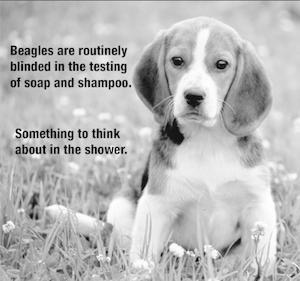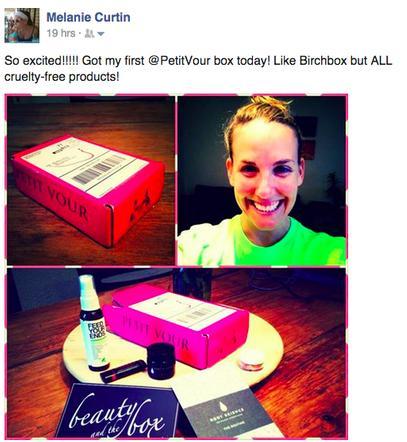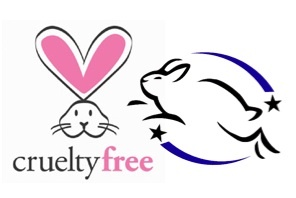I've always loved the concept of Birchbox. As a young woman, I adore the idea of getting new beauty products mailed to me on a monthly basis, for around $10. I especially like the fact that products are in small sizes, both because then I can sample them and because I travel all the time (sometimes smaller is better ... sometimes).
So after having heard about Birchbox for ages, a month or so ago I finally made it to their site. And I was surprised to find something glaringly missing.
When it comes to beauty products, I have two main priorities:
- Cruelty-free
- High-quality
The most important thing to me is that my products are good and kind. I'm not OK with putting anything on my body or in my hair that involved the torture of animals. And let's be real: Torture is what happens to animals that are tested on.
I'm not alone, either. There's a pretty large contingent of consumers who are committed to the same (Vitacost puts the number at 75 percent of women).
I was therefore confused when I couldn't find a cruelty-free box on Birchbox.
At first I thought maybe it was me. Perhaps I just wasn't looking in the right place. So I did what any Millennial would do who wants to engage with a brand: I posted on their Facebook wall.
A few things about this. First, while it made sense for them to push me to birchbox.com (twice), the cool part of their model is the delivery of the box itself; it's the main value prop. I know I can always go online and shop for makeup, but it's way more fun to have a little box of it delivered to me each month.
Second, I was annoyed there was no cruelty-free box. More annoyed than I "should" have been. That's when I realized I wasn't really annoyed; I was disappointed.
Birchbox has a huge audience (1.2 million Likes on Facebook and counting). It has massive influence. Its gigantic tribe of young people will likely be buying beauty products for the rest of their lives, so the fact that Birchbox exposes them to new products is a big deal -- some of them could become brand loyal for life.
When I got that Facebook message, I realized I'd been looking up to Birchbox as a company. I liked their marketing and brand. I liked their concept and their messaging. I realized that more than just not having the box itself, what I was truly disappointed about was feeling like Birchbox was wasting its own potential as a leader in the industry.
In a recent poll we did of Millennials, corporate social responsibility ranked high on the list of things important when evaluating brands. I'm one of many for whom ethical practices (both product sourcing and treatment of employees) is something I look for in the companies I support. And I may be biased, but I want part of the story of my generation to be that we held companies to a higher standard. I want us to prove that you can do good business and do good. I know it's possible.
I also work for OpiaTalk, the hyper-conversion widget for eCommerce retailers. We work with online retailers similar to Birchbox, to help them sell more, faster. Our social commerce widget goes on a retailer's site to drive immediate conversions and opted-in leads. Professionally, Birchbox is the perfect company for us to work with. I know OpiaTalk could help them sell more.
At the same time, on a personal level I'd feel a lot more excited about helping them if they used their brand capital for good -- especially because they target young people. I'd love to see them use their power to support companies with great practices and educate people in a fun, simple way about cruelty-free products (not to mention give the option to those who already support the cause).
In other words, I'd have tremendous respect if Birchbox used its platform to help consumers make healthy choices not only for themselves individually, but for the ecosystem as a whole.
To be clear, I don't think the people at Birchbox are animal-hating monsters. I really don't. They're probably passionate about their jobs and excited about their brand. I also think there are probably a lot more consumers who are into cruelty-free and would buy that kind of box from them; they just haven't made their voices heard.
So if you're with me, let's try a social experiment! Tweet at Birchbox or post on their wall and tell them you'd love to see a cruelty-free box. Whichever method you use, use the hashtag #GoodNKind so we can track whether our contributions actually add up. Ideally we want them to wonder, "Where'd all these #GoodNKind people come from!?"
We come from a land far, far away from Cruelty-Full (aka Middle Earth), Birchbox. We hail from the land #GoodNKind.
--
As for me, my story has a satisfying ending. Check out what was posted on the Birchbox wall, just under my post: #crowdsourcing
I did check out Petit Vour, and signed up on the spot. Just got my first box last week, and immediately used my cool mud mask from Yarok, and my shimmery earth-toned eye shadow courtesy of Modern Minerals when I went out that night.
I'm so fancy. You don't even know.
You probably do know that upon getting my box, I couldn't have been more thrilled.
Unless Birchbox read this, saw all of our #GoodNKind tweets and FB messages, put together a cruelty-free box, and then announced it with lots of ethical fanfare, from LA to Tokyo.
Note: If you want to join me in the movement for a cruelty-free beauty industry, there's an app for that: Bunny Free will show you which brands are good and kind. Or just check the old-fashioned way -- every time you buy your soap, shampoo, or makeup, look for the symbol of a bunny like the ones here on the left, or an explicit statement like "We do not support animal testing." If you DON'T see a bunny or that statement, that brand DOES test on animals.






